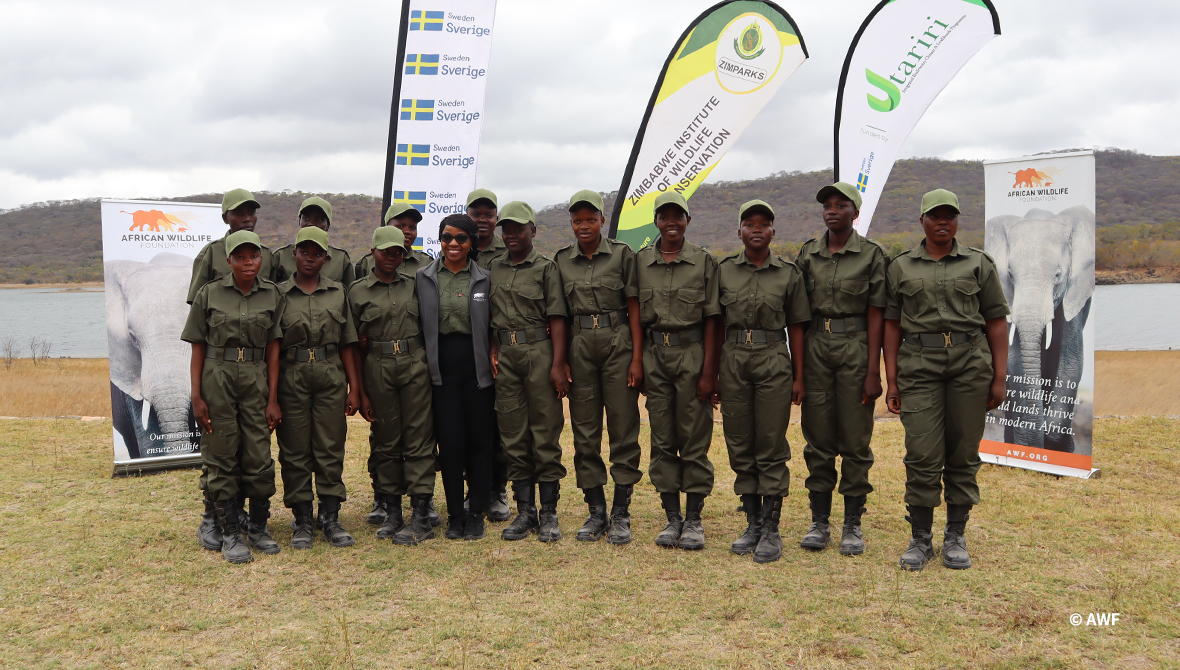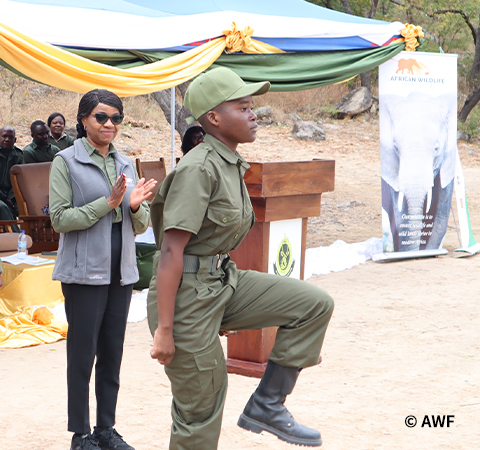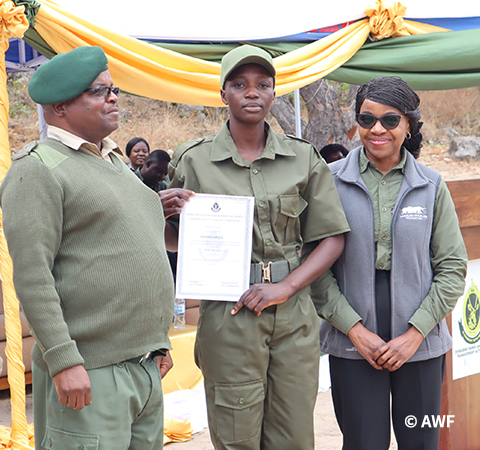AWF Empowers Young Women on the Front Lines of Conservation in Zimbabwe

AWF's Country Director in Zimbabwe, Olivia Mufute, joined a group of women scouts to celebrate their accomplishments.
In the heart of Zimbabwe’s expansive Muzarabani District, bordering Mozambique, Missy Muchadei’s passion for conservation was ignited by the harsh realities of human-wildlife conflict. Born in 2004, Muchadei’s immersion into conservation stemmed from her community’s ongoing struggle to coexist with wildlife.
Muzarabani, nestled within the Mashonaland Central Region, boasts iconic species like elephants, buffalos, and lions. It’s also home to the Mavuradonha Mountains, a Key Biodiversity Area renowned for its diverse wildlife. However, poaching and illegal wildlife trafficking threaten this ecological treasure trove. Dedicated conservationists like Muchadei are rising to this challenge.

Missy Muchadei is a community scout from Muzarabani District, Zimbabwe.
“I joined the community wildlife scouts to help my community manage human-wildlife conflicts,” Muchadei explains. “As a Gen Z representative, I show that our generation is passionate about conservation and determined to break stereotypes in a traditionally male-dominated field.”
Beatrice Kapota, 23, from the Mbire District, shares Muchadei’s passion. Witnessing the dangers posed by wildlife, particularly crocodiles, to her community motivated her to become a scout. “We face challenges due to wildlife, especially crocodiles,” Kapota says. “As a scout, I promote peaceful coexistence and raise awareness through community campaigns.”
In July 2023, Muchadei and Kapota were among 28 scouts from Mbire and Muzarabani who graduated from the Zimbabwe Institute of Wildlife Conservation (ZIWC) after completing a month-long basic ranger training course. This initiative, funded by the Swedish International Development Agency (SIDA), Danish International Development Agency (DANIDA), and private donors, was made possible by the African Wildlife Foundation (AWF) through their ongoing ‘UTARIRI’ project focused on integrated conservation and livelihoods in the Zambezi Valley.
Despite being the youngest in her class, Muchadei emerged as the top scout, while Kapota received the ‘Most Disciplined Scout’ award. Almost a year later, we spoke with them about their experiences.

Beatrice Kapota is a community scout from Mbire District, Zimbabwe.
Kapota admits that before the training, she felt unequipped. Now, she’s confident in handling human-wildlife issues, promoting peaceful coexistence, and educating communities on conservation. “We build relationships with communities by exchanging ideas,” Kapota explains. “If people encounter challenges, they come to us, and we assist in the best way possible.”
Muchadei’s patrolling experience exposed her to the harsh reality of poaching. She recalled encountering the remains of a zebra killed by a gun, a stark contrast to traditional poaching methods. She aspires to inspire other women to join the fight against poaching and resolve human-wildlife conflicts.
In 2018, with funding from the European Union, AWF facilitated the training of the first five female community wildlife scouts in the Mbire District. Since then, the number of women interested in becoming scouts has grown significantly, with Mbire now boasting over 20 female scouts.
“Training female scouts is critical,” says Daniel Makaza, AWF’s Community-Based Natural Resources Management Officer. “They can quickly intervene in human-wildlife conflicts and train others in their communities.” He emphasizes the program’s impact on breaking traditional barriers. “The training opens doors to new opportunities. Several trained scouts have secured jobs with local councils thanks to their skills.”
Olivia Mufute, AWF’s Zimbabwe Country Director, highlights the challenges faced by scouts before the training, including limited resources and a lack of technology skills like using the Spatial Monitoring and Reporting Tool (SMART) and CyberTracker. The training addressed these gaps, equipping scouts with the necessary tools for effective work.
AWF’s work in Zimbabwe also focuses on various areas, including ecosystem integrity, human-wildlife conflict mitigation, and improved community access to natural resources. This holistic approach recognizes the interconnectedness of conservation and community development.
Zimbabwe, like much of Africa, boasts a vibrant youth bulge. According to Zimbabwe National Statistics Agency demographics, over 38.9% of the population is under 15, with another significant portion between 15 and 35. This youthful demographic presents a valuable opportunity for conservation efforts.
The success stories of Muchadei, Kapota, and the growing number of female scouts highlight the transformative power of investing in young women. By fostering their leadership and equipping them with the necessary skills, AWF empowers them to become agents of change in their communities, advancing the coexistence of wildlife and people.